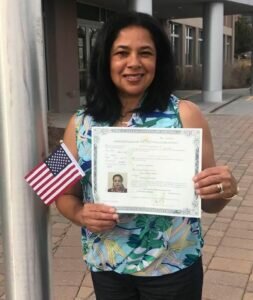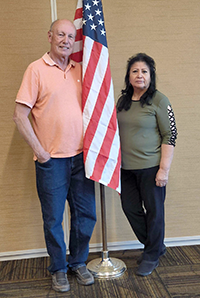The process of becoming a U.S. citizen is not easy. For the thousands that do it every year, naturalization is proof of their determination and dedication. It often takes months of learning the history and laws of the U.S., practicing oral interview questions, and waiting for notification to take the exam. Once they receive notification, applicants often have to drive hours to their state’s field office to take the exam.
Most natural-born Americans don’t realize the effort required to gain U.S. citizenship.

Roseli
Dan Shern didn’t, until his wife Roseli (pictured above) moved to the U.S. from Brazil. When she came, the two of them made it a goal for her to obtain her citizenship. And as Roseli went through the application process, Dan was alongside her quizzing her, watching videos, and talking about history. He sat in some of Roseli’s tutoring sessions at the library, where a retired judge helped her prepare.
“I learned all the questions along with her. We went through the whole process of filling out the application for citizenship together,” Dan said. “So, I realized after she got her citizenship that I had the background to teach someone else how to do this.”
“I just realized I had what I needed to pay it forward,” he said.
Now he volunteers for 90 minutes a week with the Adult Learning program at Mesa County Libraries where he lives in Colorado to tutor individuals seeking citizenship.
After working with students for about two years, Dan said he’s seen that it takes about a year from the time someone submits their application until they’re called for an interview.
During that time, Dan helps students learn everything they need to know to be successful, from the 100 questions to answering questions during the oral interview. He said the history questions tend to be the hardest to learn.
“They’re not acquainted with our history—even the basic concept that we were liberated from England. So, we start way at the beginning,” he said.
After history, understanding U.S. government is the next most difficult thing.
Through ProLiteracy’s National Book Fund, member program Mesa County Libraries received a grant to purchase books from the popular New Readers Press Citizenship Passing the Test series. Dan uses the books and says they are structured in a way that he can address the student’s needs, whether it’s just some extra study, or if a student has no background at all.
He’s currently working with a student named Irene who is from Honduras. Together, they’ve gone through the Civics and Literacy book beginning to end.
“The nice thing about the book is that it introduces the questions slowly, so you don’t overwhelm students with 100 questions right at the beginning,” he said. “There’s 10 chapters and you can do a chapter a week or maybe one chapter every two weeks. So, over the course of 20 weeks, we’ve studied the book.”
He helps students learn the 100 questions by creating flashcards with each lesson. They write out each question as well as its answer. This not only helps them improve their English, but also helps them focus on and learn the one answer per question they plan to provide on the test. Of the 100 questions, students will randomly be given 10 to answer. They must get six correct.
“[Some questions] might have multiple answers, but you want the student to decide what answer they are going to give in their interview,” Dan said.
Next, using the Ready for the Interview book, Dan prepares students to answer questions they will be asked during the interview about their past. They can be asked questions like whether they’ve ever been a prostitute, a habitual drunkard, or a terrorist, and it’s the interviewer’s job to determine if the applicant is telling the truth.
The applicant, therefore, must prove that they understand the questions, and the interviewer checks this by asking for definitions of certain words.
“[The interviewer] will randomly pick questions and they’ll ask, ‘can you tell me what a prostitute is? Can you tell me what a mental institution is? Can you tell me what an insurgent group is?’ And these are very difficult questions, even for Americans to answer. I mean, I don’t think most Americans would know the difference between a paramilitary group and a police unit,” Dan said. “I had to learn those things, too.”

Dan with his student Mercedes.
To learn these definitions, students create more flashcards that Dan uses to quiz them.
Ready for the Interview includes a lot of tips for answering these questions. Dan then holds mock interviews and walks his student through the swearing in process, taking the oath to tell the truth, and giving them a mock reading and writing test on his laptop to increase their comfort level using technology. He also asks them interview questions to make sure they’re ready.
By the end, each student has created hundreds of flashcards and put in hours of studying. They know the content inside and out, but becoming a citizen means more than that. Dan said many immigrants have lived in the country for years as permanent residents, yet they still don’t feel like they fully belong. This is their chance.
He said citizenship erased Roseli’s feeling of being an outsider, and “I remember my wife saying for her this was a turning point for her and her English, because she always felt like ‘my English is inadequate. … I’m not good enough at English.’ But when she passed the citizenship test, it was proof to her that her English was good enough to communicate and to actually accomplish something.”
Using books from the National Book Fund, Dan helped his student Mercedes (pictured in image on the left) pass her citizenship exam in 2021. He expects Irene to take her test in January 2023.
Give more students the resources they need with a donation to the National Book Fund